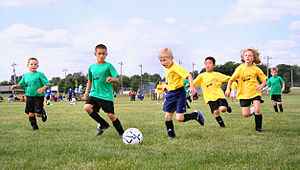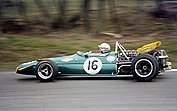Portal:Sports
The Sports Portal

Sport is a form of physical activity or game. Often competitive and organized, sports use, maintain, or improve physical ability and skills. They also provide enjoyment to participants and, in some cases, entertainment to spectators. Many sports exist, with different participant numbers, some are done by a single person with others being done by hundreds. Most sports take place either in teams or competing as individuals. Some sports allow a "tie" or "draw", in which there is no single winner; others provide tie-breaking methods to ensure one winner. A number of contests may be arranged in a tournament format, producing a champion. Many sports leagues make an annual champion by arranging games in a regular sports season, followed in some cases by playoffs.
Sport is generally recognised as system of activities based in physical athleticism or physical dexterity, with major competitions admitting only sports meeting this definition. Some organisations, such as the Council of Europe, preclude activities without any physical element from classification as sports. However, a number of competitive, but non-physical, activities claim recognition as mind sports. The International Olympic Committee who oversee the Olympic Games recognises both chess and bridge as sports. SportAccord, the international sports federation association, recognises five non-physical sports: bridge, chess, draughts, Go and xiangqi. However, they limit the number of mind games which can be admitted as sports. Sport is usually governed by a set of rules or customs, which serve to ensure fair competition. Winning can be determined by physical events such as scoring goals or crossing a line first. It can also be determined by judges who are scoring elements of the sporting performance, including objective or subjective measures such as technical performance or artistic impression. (Full article...)
Selected articles
Selected pictures
Did you know...
- ...that Leyton F.C. had to win a High Court action in order to call itself the oldest football club in London?
- ...that the Iowa Cornets made it to the Women's Professional Basketball League championship in both of its seasons in the league, and lost both times?
- ...that in 1994, Horace Dove-Edwin became the first medalist in athletics for Sierra Leone, but lost it due to a positive doping test?
- ...that Sabeena Saleem is the first mother to compete alongside her daughter at the Asian Games in Indian bowling history?
- ...that Jaime Navarro (pictured) was the opposing and winning pitcher for the inaugural Texas Rangers game at The Ballpark in Arlington in 1994?
Selected quote
Selected athlete
Graham grew up in Waukegan, Illinois, the son of music teachers. He entered Northwestern University in 1940 on a basketball scholarship, but football soon became his main sport. After a brief stint in the military at the end of World War II, Graham played during the 1946 season for the National Basketball League's Rochester Royals, who won the league championship that year. Paul Brown, Cleveland's coach, signed Graham to play for the Browns, where he thrived. After he left football in 1955, Graham coached college teams in the College All-Star Game and became head football coach at the Coast Guard Academy in Connecticut. After seven years at the academy, he spent three unsuccessful seasons as head coach of the Washington Redskins. Following his resignation, he returned to the Coast Guard Academy, where he served as athletic director until his retirement in 1984. He was elected to the Pro Football Hall of Fame in 1965. (Full article...)
Selected team
In the 1960s, Brabham was the world's largest manufacturer of open wheel racing cars for sale to customer teams, and had built more than 500 cars by 1970. During this period, teams using Brabham cars won championships in Formula Two and Formula Three. Brabham cars also competed in the Indianapolis 500 and in Formula 5000 racing. In the 1970s and 1980s, Brabham introduced innovations such as the Gordon Murray designed "fan car"—which won its only race before being withdrawn.. The team won two more Formula One drivers' championships in the 1980s with Brazilian Nelson Piquet. He won his first championship in 1981 in the Ground effects BT49-Ford, and became the first to win a drivers' championship with a turbocharged car in 1983. In 1983 the Brabham BT52, driven by Piquet and Italian Riccardo Patrese, was powered by the BMW M12 Straight-4 engine, and powered Brabham to four of the team's 35 Grand Prix victories.
Midway through the 1992 season, the team collapsed financially as its owner was unable to make repayments against loans. The case was investigated by the United Kingdom Serious Fraud Office. In 2009, an unsuccessful attempt was made by a German organisation to enter the 2010 Formula One season using the Brabham name. (Full article...)
In this month
- April 6, 1896 – The first international Olympic Games held in the modern era, the 1896 Summer Olympics (pictured), begin
- April 8, 2005 – The inaugural Islamic Solidarity Games open in Mecca, Saudi Arabia
- April 14, 1900 – Union Cycliste Internationale, the world governing body for sports cycling, is founded in Paris, France
- April 19, 1897 – The first Boston Marathon is run
- April 26, 2002 – The inaugural season of the China Baseball League begins
Topics
Related portals
Categories
Things you can do
 |
Here are some tasks awaiting attention:
|
Associated Wikimedia
The following Wikimedia Foundation sister projects provide more on this subject:
-
Commons
Free media repository -
Wikibooks
Free textbooks and manuals -
Wikidata
Free knowledge base -
Wikinews
Free-content news -
Wikiquote
Collection of quotations -
Wikisource
Free-content library -
Wikiversity
Free learning tools -
Wiktionary
Dictionary and thesaurus




























































